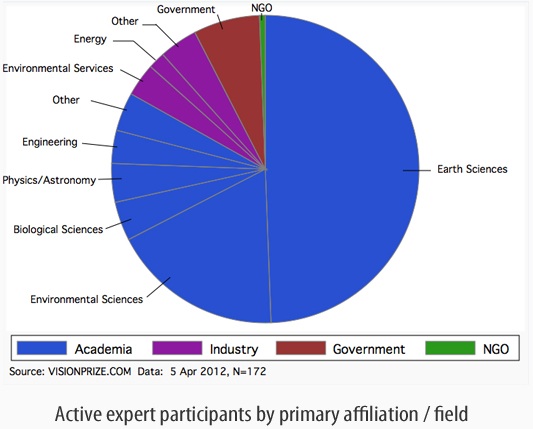Vision Prize Results
Posted on 19 July 2012 by dana1981
The Vision Prize is an online poll of scientists about climate risk. It is an impartial and independent research platform for incentivized polling of experts on important scientific issues that are relevant to policymakers. In addition to assessing the views of scientists, Vision Prize asked its expert participants to predict the views of their scientific colleagues. The participant affiliations and fields are illustrated below.

As this figure shows, the majority (~85%) of participants are academics, and approximately half of all participants are Earth Scientists. Thus the average climate science expertise of the participants is quite good. The average h-index of the participants is 12, which is pretty good considering that some private industry professionals like myself participated. As a result, the answers to the poll questions were in line with the scientific consensus on human-caused global warming.
For example, approximately 90% of participants responded that human activity has had a primary influence over global temperatures over the past 250 years, with the other 10% answering that it has been a secondary cause, and none answering either that humans have had no influence or that temperatures have not increased. Note also that the participants expected less than 80% to peg humans as the primary cause, and a few percent to say humans have no influence.
Over 70% of participants also answered that an increase in atmospheric CO2 to 550 ppm would lead to a 1-3°C surface warming relative to year 2000 temperatures, with over 40% answering 2-3°C, and only ~8% answering less than 1°C.
Remember that in 2000 we had already experienced ~0.8°C surface warming, so these answers are equivalent to 70+% of participants answering that either the transient climate response or equilibrium climate sensitivity (depending on how they interpreted the question) is ~2-4°C for doubled CO2, and only about 8% answering that it's lower than ~2°C, with a further ~20% answering that sensitivity is higher than ~4°C. In other words, the 'climate sensitivity is low' crowd is very poorly represented, which is not surprising given the expertise of the participants and the preponderance of evidence that climate sensitivity is not low.
Approximately 80% of participants also answered that in a business-as-usual scenario in which governmental policies do not change, the 2000-2050 average global surface warming will be 1-3°C, with nearly 40% answering 1.5-2°C.
Regarding CO2 emissions and concentrations, approximately two-thirds of participants answered that we can only keep CO2 levels below 550 ppm with current technology if there is a change in government policy. The other one-third of participants answered that we cannot keep CO2 below 550 ppm with current technology.

You can see the other Vision Prize questions and participant answers here.
The prize aspect involved a competition amongst participants to predict how other participants would answer these questions, which formed the basis of the 'expected distribution of answers' in the graphics above. The Leaderboard contains some familiar names. Skeptical Science's own skywatcher came out on top, and I (Dana Nuccitelli) rounded out the top 25. David Karoly, Kevin Trenberth, and Bart Verheggen also made the list. The rewards are gift card prizes for the charity of our choice - skywatcher and I both chose the Union of Concerned Scientists, as it only seemed fitting to give climate-related award winnings to a group fighting against climate misinformation.
The results of the Vision Prize once again confirm the scientific consensus on human-caused global warming - in fact, more of a consensus than the participants even expected. This group of relatively well-informed scientists overwhelmingly agreed that humans are driving global warming, that climate sensitivity is within the range stated by the IPCC, and that we need to implement climate policies to avoid blowing past the 2°C 'danger limit'.
Note: the Vision Prize results have been added to the Intermediate rebuttal to "there is no consensus"































 Arguments
Arguments


























 0
0  0
0






Comments